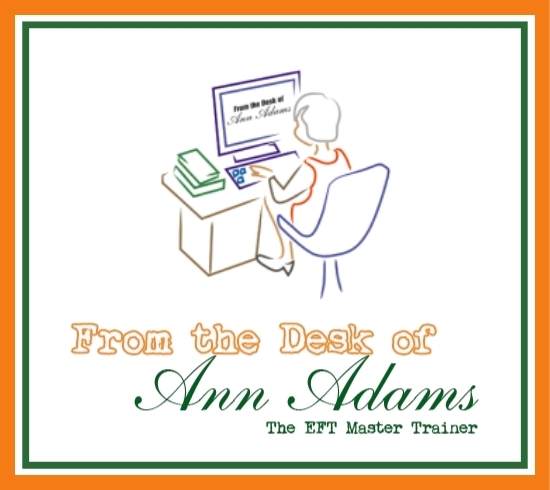How Veterans Perceive Therapy and Therapists
Only 50% of veterans with distress ever come for services. Of the half that do walk into the “Behavioral Health” services door, you have only about 20 minutes to show them you “get them” before 60% decide to drop out after the first visit. So what does it take to engage the veteran?
Apparently, the stigma of going to mental health services is not the biggest barrier to services! Bellaruth Naparstek worked at Fort Sill in Oklahoma for a year. She gave the above statistics and says that veterans have significant levels of “distrust, dislike and contempt” for the providers.
Many EFTers would like to share the incredible tool, EFT, with veterans. Some have a vision of taking it into the VA. There are challenges all around with this noble goal. In 2011 Bellaruth Naparstek, author and well known in the trauma field for her work with Guided Imagery, in a talk she gave NICABM shared her experiences working for a year at Fort Sill in Oklahoma. Below I share my notes from that talk.
Bellaruth listed what she learned of their perceptions.
- It’s about the mission, the team – it is not “all about me” as we generally encourage them to focus on.
- It’s about action, not about feelings.
- Humility and understatement is expected. Go watch Gary Cooper in High Noon for an example of what they respect.
- Be more formal in addressing officers – call him, or her, “sir.” The enlisted men may be OK with informality, slang and profanity.
- Flexibility and speed is respected. They are used to “changing on a dime.” Mulling, pondering, obsessing they see as contemptible.
- Say what you mean, get to the point then shut up, no embellishments.
- They take their “lumps” with no whining or excuses – we therapists actually encourage people to “whine.” Don’t.
- Be gracious, give credit to others, take the blame.
- The brotherhood (or sisterhood) is its own planet. Civilians don’t understand.
Watch, too, the terms you use. For instance instead of hyper vigilance, the term situational awareness is more acceptable. They dislike the term PTS, Post Traumatic Stress, and they reallydislike it when you add the “D” to PTSD as they feel judged as a “nut case.” The term combat stress is more meaningful.
She says you have a disadvantage in their perception of your ability to help if you don’t have military experience. She suggests dealing this upfront. Admit it; give a message of, “It’s a disadvantage to both of us that I don’t have the same background of military service. Be patient with me and help me understand. You can teach me as we go.”
Do’s and Don’ts for Therapists of Veterans
During her year at Ft. Sill, Bellaruth Naparstek asked numerous veterans what the “worst” and “best” things were that therapists had ever done. What they told her boils down to a list of what to do and what not to do when working with a veteran. Some of this list may feel like Counseling 101. Keep in mind, however, these are on the list because either doing it was very important or not doing it tended to cut rapport or send them out the door.
- LISTEN! Patiently. Let them tell their story. Use their words.
- Don’t expect them to spill their guts in first session. The quality of your listening, your attitude of respect and level of interest greatly affects rapport – and a second visit.
- Make eye contact.
- Be authentic. Don’t try to fake it. Or hide behind your status or position.
- If have military medals certifications, etc. display them.
- Get out from behind your desk. Be comfortable, relaxed.
- Add a psycho-educational component. Explain the brain science to help understand what is going on.
- Don’t abruptly end the session. When close to end, transition to the ending.
- Don’t compare combat trauma with civilian trauma.
- Don’t ask if they’ve killed anyone.
- Don’t be in a hurry to start on meds. Listen first. Assess if it’s really helped.
- Don’t bring your politics into the session – pro or con.
- Don’t ask about their childhood history. They have enough to deal with in the here and now. If they bring it up then OK to address.
- Don’t give false assurances. They can master the symptoms, they can grow from it, they can come out of it stronger but they will never go back to being the “same” as before
- Never say you “understand.”
Bellaruth agrees with many trauma experts who are now saying that traditional talk therapy is not effective for PTS. She recommends that all therapists become proficient in 2 or 3 alternative techniques – she includes EFT on her list. She encourages therapists to develop a network of referral sources for other alternatives.
If you were in the military, or work with veterans I’d love to hear your take on this issue. Do you agree or disagree, and why, with Bellaruth Naparstek’s list?
Make your comments below.




4 responses to “What do VETs really want in therapy?”
Very helpful, useful information. Thanks for sharing!
Excellent lists, thank you. One caveat: A few vets are comfortable talking about how they feel, truer of female vets than male. But even though it is “about the team” and not [necessarily] about them, vets vary like any other human group in their openness to talking about “touchy feely” stuff. Vets are not one size fits all. Your list is a good match to the majority, however, and I applaud your sharing these lists with the alternative (esp. EFT) community.
I could not agree more. While it is helpful to be aware of common similarities we should never assume that the person sitting in front of us shares any one of those commonalities. Getting to know exactly who it is sitting in front of us, i.e. what they want, like, dislike, expect, find helpful, etc., is a critical part of successful practice.
Thank you for this very useful information. As an EFT practitioner and a counseling student who’s about to start an internship at the VA, it’s very valuable to me to read about how to best establish rapport with my future clients. I’m aware I can’t possibly understand what military experience is like and I hope I can still engage them in the conversation thanks to the information you shared.